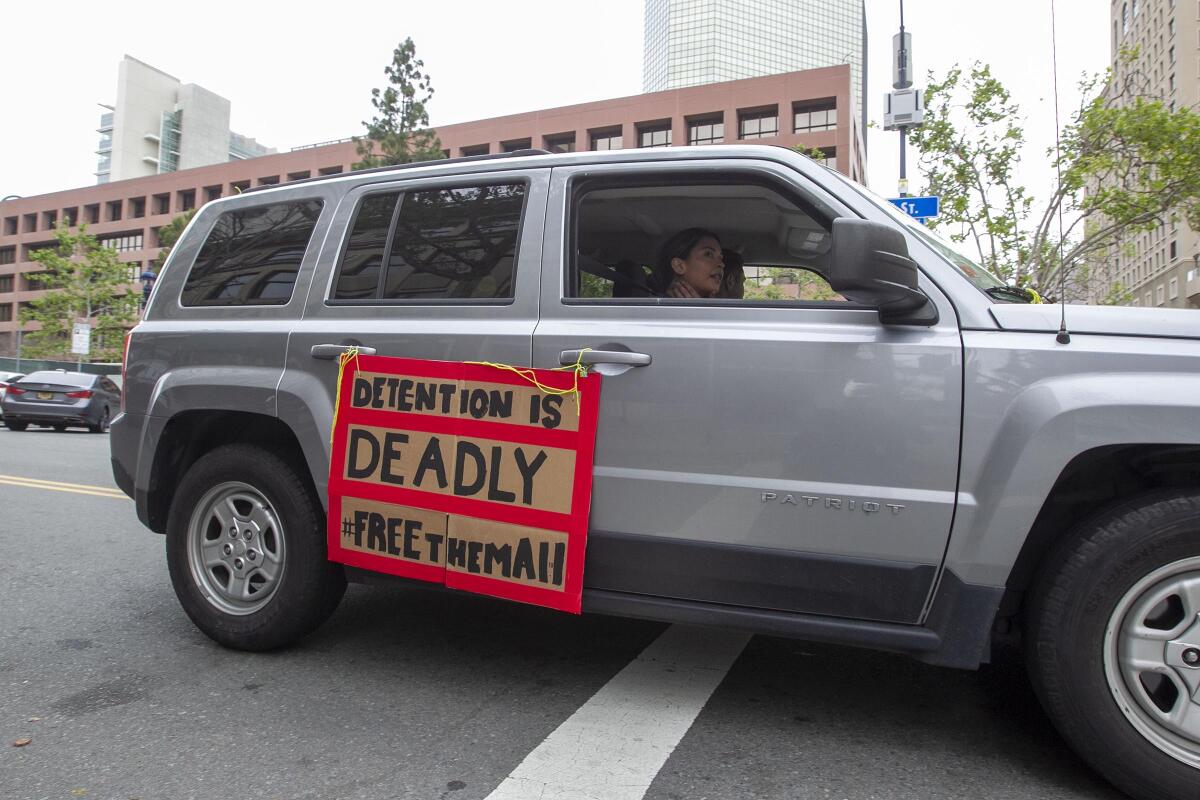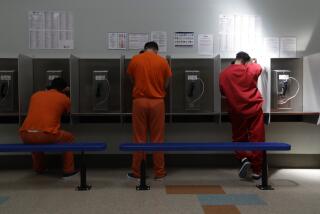COVID-19 is rampant in ICE detention facilities. Where’s the vaccine?

- Share via
The COVID-19 pandemic and the subsequent vaccine rollout have exposed deep issues of equity, access and justice in California. Perhaps no population has been more marginalized in the rollout than those who are held against their will in immigration detention facilities. Nearly a year into the pandemic, there is still no known plan in place and no agency or group clearly responsible for making sure that immigrants in detention in the state will get vaccinated.
Immigration and Customs Enforcement detains immigrants in six facilities in California. Five of them are owned and operated by private, for-profit corporations where reports of maltreatment have been commonplace, including court-cited “deliberate indifference” toward the spread of the coronavirus. General conditions have been so bad at the sixth detention center, the Yuba County jail, that it has been under a court-ordered consent decree since 1979.
Based on data collected from April to August 2020, the coronavirus rate among immigrants in ICE detention centers nationwide is 13 times the rate of the general U.S. population. To date, more than 9,000 individuals in ICE custody have been infected and at least nine have lost their lives to the virus. Each ICE facility in California has seen outbreaks, with the largest, at the Otay Mesa Detention Center, resulting in hundreds of infections and one death.
These outbreaks not only threaten those held inside and those who work there, but they can also easily overwhelm the medical resources of surrounding communities.
All of this underscores a fact that is glaringly obvious: Immigrant detention is inhumane, immoral and wholly unnecessary. It needs to be abolished, and people in civil proceedings — which is the case for virtually all those in ICE detention — should be allowed to go home and await their day in court.
And yet ICE has refused to dismantle its detention machine even as COVID-19 ravages its facilities. In South Florida, it fought the release by the courts of individuals who are medically vulnerable. A federal judge in Miami called ICE’s failures to protect detainees from the pandemic “cruel and unusual punishment.”
Perhaps not surprisingly, ICE has also seemingly washed its hands of the responsibility to provide the vaccine to individuals it stubbornly refuses to release. In December, an ICE spokesperson announced that it would be up to states to decide when and how to vaccinate individuals in the agency’s custody.
This appears to be news to California policymakers. At the end of January, one member of the state’s Community Vaccine Advisory Committee told a reporter that the assumption had been that vaccinating immigrants at the ICE centers would be “up to the federal government.”
Immigrant advocates, including the two organizations we represent, have raised the issue of detention vaccination in letters with state officials, but we have yet to receive a response about how and when the vaccine will be delivered.
Over the last five years California has served as a model for the nation by passing groundbreaking legislation to protect the health and safety of immigrants in detention. This year the Legislature is continuing that legacy with AB 263, a bill designed to ensure that public health orders are enforced in ICE detention facilities. Even before it passes, the state must do all it can to address the rollout of vaccines and to protect and save lives in these facilities.
As California works to reorganize and improve its overall vaccination rate, it must include a specific plan that recognizes the urgency of the COVID crisis in ICE detention. It should ensure that individuals in these facilities have access to the vaccine, as well as the information they need to make an informed decision about whether to get vaccinated.
California must continue to serve as a model for immigration policies that ensure equity, access and healthy communities.
Bill Ong Hing is a professor of law and migration studies at the University of San Francisco and the founder of the Immigrant Legal Resource Center in San Francisco. Hamid Yazdan Panah is the advocacy director for Immigration Defense Advocates, based in the Bay Area.
More to Read
A cure for the common opinion
Get thought-provoking perspectives with our weekly newsletter.
You may occasionally receive promotional content from the Los Angeles Times.









